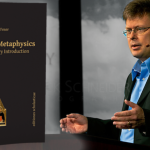Is a Proof Bad If It Fails to Convince Everyone?
by Dr. Michael Augros
Filed under The Existence of God
Some atheists will object to arguments for God by observing, "If a particular proof for God is so strong, why doesn't it convince everyone?"
This objection is perhaps the most prevalent, and the cheapest one to make, yet a complete answer to it involves several components and is also interesting in its own right.
This objector presents the theist with a dilemma: either I must pretend to be a supergenius like none the world has ever seen, presenting new and amazing arguments for God’s existence that will, for the first time ever, convince everyone and bring hordes of atheists to their knees, or, less flatteringly, I must countenance the possibility that I am a hack with prodigious ignorance of the failures of past thinkers and arguments concerning this matter.
Well, I freely confess I am no supergenius. The arguments in my recent book, Who Designed the Designer?: A Rediscovered Path to God's Existence (Ignatius Press, 2015), convincing as I take them to be, are not my own inventions. Practically all of them come from a great tradition of thinkers that began with the pre-Socratic philosophers and acquired fresh vigor with Socrates and Plato and Aristotle, then continued through Boethius, the great Arab Aristotelians, and Aquinas, and lives on today in various universities around the world.
But if any of these arguments is truly a proof, then why has none been universally accepted? Why do so many smart people continue to reject them all?
Before I answer that question, it is only fair to note that since the time of Aquinas, if not since the time of Aristotle, there has always been a significant number of philosophers in the world who have accepted arguments like those in my book as successful proofs. That is roughly twenty-three centuries of measurable success. Somehow such reasonings persist down through the ages, convincing thousands of great minds in every generation along the way, some of whom were originally atheists. It is simply a matter of fact, in other words, that the arguments do convince many smart people and have done so since they first saw the light of day. That still leaves us with the unconvinced philosophers to account for, of course.
Some who go by the name philosophers are quacks, and we need not concern ourselves with what they think. Many others struggle with a willful attachment to atheism. Unlike any mathematical truth, the truth about God’s existence or nonexistence is profoundly relevant to everyone’s conception of goodness and happiness and purpose. Not only God but many other things considered by philosophers and not mathematicians possess this potentially life-altering character—a fact perceived most keenly by the philosophers themselves. Hence, there is a possibility of desire influencing thought in philosophical questions where there is no correspondingly strong element of desire in mathematical investigations. We should not expect, in other words, that even the most solid and genuine proofs of philosophy will enjoy the same universal convincing power as those in mathematics. In philosophical matters, even genuine proofs can be surrounded by obstacles nowhere to be found in the world of mathematics.
But if we continue scanning the people who have been called philosophers, after leaving aside quacks and those whose thinking is unduly shaped or inhibited by desire or prejudice one way or the other, we will still find a number of them left to be explained. There are many philosophers in the world who do not go about promoting arguments like those in my book and are nevertheless neither quacks nor particularly attached to atheism. What can be said about those?
It seems to me that most of them simply have never heard the arguments. This might at first sound incredible. Practically everyone who can read has heard of Aristotle, and most people have heard of Aquinas. Then how can there be nonquack philosophers who have not studied Aristotle’s or Aquinas’ arguments for God’s existence? The answer is not far to seek. We must remember that philosophy is an enormous enterprise with a history spanning well over two thousand years and that modern education encourages specialization. That is a recipe guaranteeing significant lacunae in every philosopher’s intellectual formation. I believe it was Konrad Lorenz who said, “Every man gets a narrower and narrower field of knowledge in which he must be an expert in order to compete with other people. The specialist knows more and more about less and less and finally knows everything about nothing.” Not every philosopher winds up as bad as all that, but some degree of specialization is necessary, and consequently a generous dose of ignorance of one’s own general field is inevitable. Much the same is true in science. A particle physicist might be as ignorant as I am about the Krebs cycle of respiration or of the chemical formula for caffeine. A Kant expert might hardly have read two words of Aristotle. Even an expert in Aristotle’s logical works might know next to nothing about his ethical and political writings.
There are also powerful academic disincentives for anyone who might be tempted to study Aristotle or Aquinas at all with a view to finding out the truth. One of these is that Aristotle and Aquinas are both thinkers from the distant past. That is sufficient evidence for most people, even most of those who go into philosophy these days, that their thinking is in all ways outmoded. It doesn’t help matters that they were geocentrists. The result is that the study of them is widely regarded as an exercise in the history of thought, not so much a properly philosophical enterprise. But if we do bother to read them, we find in their writings more than geocentrism and similarly outdated ideas (which, by the way, they themselves regarded as hypotheses and distinguished sharply from philosophical truths that they considered absolutely certain and timeless). In Aquinas we find that the statements emphasized and insisted upon are not those like “Earth is at the center of the universe” but those of another type. I mean self-evident statements, such as “Nothing gives what it does not have” and “Among things actually existing but unequal, one must be the maximum” and also the necessary consequences of these. Such statements remain as true as ever. They are not time sensitive. And they have nothing to do with geocentrism.
Nonetheless, a thoughtlessly inherited prejudice against reading “ancient” and “medieval” thinkers for genuine insights into reality persists in modern universities, as it has now for at least a century or two. And so indeed the God-philosophy of Aristotle and Aquinas is read by a bare minimum of today’s philosophers and read with any degree of care and open-mindedness by far fewer still. That is why Christopher Hitchens (who was not a philosopher) could mention the word geocentrist and consider Aristotle and Aquinas quite dispatched by it. It is also why Richard Dawkins (also not a philosopher) can grossly misrepresent Aquinas’ five ways while provoking hardly a squawk from any but a handful of philosophers. And it is also why Bertrand Russell (who was a philosopher) could set up a mere straw man and call it the “argument of the First Cause”.
Now let’s sum that all up. Unlike most mathematical questions, the God question is among those that affect human desires, and so it inevitably becomes the object of prejudices, intellectual fashions, educational policies, social trends, laws, obnoxious religiosity, and other cultural phenomena that can skew our thinking about it in either direction, for or against God. That philosophers do not all agree about it is therefore no proof that it lies beyond the sphere of inherently decidable (and decided) questions. The disagreement is instead largely due to other causes, such as those I have been describing. To suppose that the failure of an argument for God to convince some thinkers is necessarily the fault of the argument, before even identifying such a fault, is therefore a lazy assumption valued only by those who would avoid having to understand the argument itself.
Adapted from Who Designed the Designer?: A Rediscovered Path to God's Existence (Ignatius Press, 2015) by Dr. Michael Augros. Copyright 2014, Ignatius Press. Reprinted with permission.
Related Posts
Note: Our goal is to cultivate serious and respectful dialogue. While it's OK to disagree—even encouraged!—any snarky, offensive, or off-topic comments will be deleted. Before commenting please read the Commenting Rules and Tips. If you're having trouble commenting, read the Commenting Instructions.













